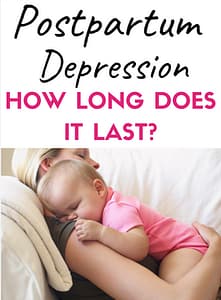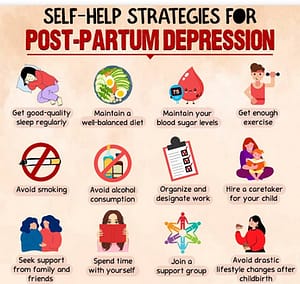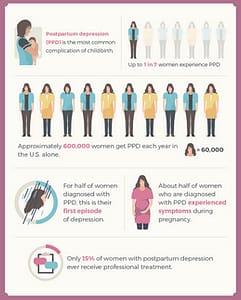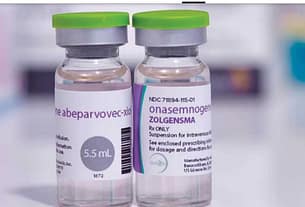Becoming a mother is an experience like no other—a time of joy, anticipation and love. But, for some women, new motherhood can come with challenging emotions.New parents are part of a patient population that can fall through the cracks in the medical care system. Every year lakhs of babies are born to individuals who are depressed.
Postpartum depression often goes undiagnosed and untreated. Many women struggle with feelings of sadness, anxiety and overwhelming exhaustion. These emotional struggles, coupled with the physical demands of caring for a newborn, can be signs of a condition called postpartum depression (PPD).Now, doctors hope the approval of a pill for postpartum depression called zuranolone (under the brand name Zurzuvae) could raise awareness and increase treatment options for this debilitating condition.
What is postpartum depression?
About 1 in 7 women develop PPD, according to StatPearls. This mood disorder happens after childbirth. It’s characterized by persistent feelings of sadness, anxiety and despair that can significantly impact a woman’s ability to function and care for herself and her baby, according to the Mount Sinai Hospital Health Library.
Postpartum depression is feeling deep sadness following the birth of a child that lasts longer than two weeks. Individuals may feel down, depressed, guilty, irritable, or angry. They may show low interest in things they previously enjoyed, experience low energy, have thoughts of hurting themselves or others, or have changes to concentration, appetite, and sleep that affect their ability to function. It’s a common pregnancy complication that can impact both women and men. Symptoms of postpartum depression can interfere with daily life.
Postpartum depression symptoms
According to Mount Sinai, PPD typically begins within the first few weeks after delivery, although it can develop up to 6 months after giving birth. Its exact cause is not fully understood, but hormone changes, emotional factors and lifestyle contributors such as lack of support, sleep deprivation and stress can contribute.
The most common postpartum depression symptoms cited in the article include:
- Persistent sadness, hopelessness and feelings of emptiness
- Changes in appetite, leading to significant weight loss or weight gain
- Sleep disturbances, including insomnia or excessive sleeping
- Fatigue and loss of energy
- Difficulty concentrating, making decisions or remembering things
- Loss of interest or pleasure in activities once enjoyed
- Irritability, agitation or restlessness
- Feelings of worthlessness, guilt or self-blame
- Thoughts of death or suicide.
PPD shares similarities with major or minor depression in terms of its emotional symptoms and the woman’s ability to care for her newborn.

How long does postpartum depression last?
Left untreated, PPD can last several years, according to the U.S. National Institutes of Health. For some women, symptoms persist beyond the first year after giving birth and extend into the child’s toddler years. It’s important to note that with appropriate treatment and support, many women can recover from PPD and regain their emotional well-being much sooner.
What causes postpartum depression?
PPD may owe to a combination of biological, hormonal, psychological and social factors, according to the American College of Obstetricians and Gynecologists (ACOG). These include:
- Hormonal changes: After childbirth, estrogen and progesterone levels plunge. These hormonal fluctuations, similar to those experienced before a woman’s menstrual period, can trigger depression and mood swings.
- History of depression: Women who have previously experienced depression, whether before, during or after pregnancy, are at an increased risk for PPD.
- Emotional factors: Doubts and uncertainties about the pregnancy are common and can influence emotional well-being. Unplanned or unwanted pregnancies can affect how a woman feels about her pregnancy and the developing fetus. Even with planned pregnancies, adjusting to the idea of a new baby may take time. Parents of sick infants or those requiring extended hospital stays may experience sadness, anger or guilt, which can affect their self-esteem and ability to cope with stress.
- Fatigue: The physical demands of childbirth and the subsequent recovery can cause profound fatigue. It can also take weeks, and even longer, for women who have had cesarean sections to regain their strength and energy. The persistent exhaustion can contribute to feelings of emotional vulnerability and increase the risk of PPD.
- Lifestyle factors: Lack of support from others and stressful life events, such as the recent loss of a loved one, family illnesses or relocation to a new city, can significantly up the risk for PPD. These external stressors can amplify the emotional challenges faced during the postpartum period.
“The FDA approval of zuranolone is a very exciting development in the treatment of postpartum depression,” says Lauren Gimbel, MD, an assistant professor in the Department of Obstetrics and Gynecology and clinical obstetrical lead of perinatal mental health at University of Utah Health. “It adds another option for medication treatment for patients who don’t want to use traditional antidepressants.”

Postpartum depression treatments : The Mayo Clinic says the duration of treatment and recovery for postpartum depression can vary based on the severity of your depression and your unique needs. If you have an underactive thyroid or any underlying health conditions contributing to your PPD, your health care provider may address those conditions or refer you to a specialist who can provide appropriate treatment.
WHAT IS THE SIGNIFICANCE OF A POSTPARTUM DEPRESSION PILL- Zuranolone
While treatment options for postpartum depression are individualized and developed uniquely with a healthcare provider, zuranolone is the first FDA approved medication specifically developed for the treatment of postpartum depression.
In studies of zuranolone, patients with severe postpartum depression reported an improvement in their mood and a reduction in their feelings of depression as early as three days after starting the medication.
“For some patients, the main advantage of zuranolone may be that it works faster,” Gimbel says. “The improvement in symptoms was seen around two weeks after starting the medication and maintained its effect up to the 45 days it was studied.”
Typically, antidepressants can take two to four weeks to show improvement in symptoms.
Another novelty to zuranolone is that the drug is prescribed for a two-week period rather than for months. This makes it easier for patients to comply with directions on how often and for how long to take the medication. It may also improve access as it can be challenging to obtain long-term psychiatric care across the nation.
ARE THERE ANY SIDE EFFECTS?
During testing of the oral medication zuranolone patients who took it experienced minimal side effects. The most common symptoms included dizziness, fatigue, drowsiness, and upset stomach.
However, just like any medication, zuranolone might not be the best option for every individual. Women who have been treated with other medications in the past and responded well may want to use a medication they know worked instead of trying a new medication such as zuranolone.
During testing of zuranolone, the studies did not include women who were breastfeeding. So, for now, the recommendation is not to breastfeed while taking the medication. That’s because it’s not yet known how much of the medication gets into breastmilk. Individuals should also take an effective form of contraception while taking the medication and for one week afterwards, as it is not known if it is safe to take while pregnant.

POSTPARTUM DEPRESSION AND MENTAL HEALTH
The approval of zuranolone may help lift the stigma surrounding postpartum depression and start a stronger discussion about how to help new parents through this critical period in their lives and the lives of their babies and families.
This is a period of unique changes in an individual’s physical and mental health.
“We know that untreated perinatal mood and anxiety disorders are associated with negative outcomes for the birthing individual, their partner, and for their offspring,” Gimbel says. “Untreated, it impacts quality of life, engagement with medical care, increased use of substances, difficulty with attachment to the infant, and long-term developmental risks.”
That’s why it’s important for mothers to talk about their moods and any depressive symptoms or anxieties that are affecting their ability to function. This discussion is especially critical if they have thoughts of hurting themselves or their baby. It also clears the way for each individual to make choices about their treatment.
“The fact that zuranolone was developed specifically for postpartum individuals speaks to how prevalent the condition is and how important it is to develop treatment options that are more accessible to help individuals feel better sooner,” Gimbel says.





